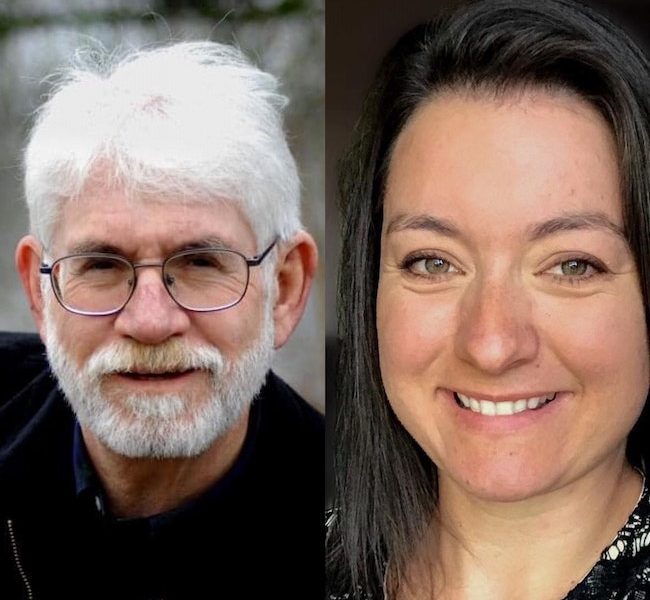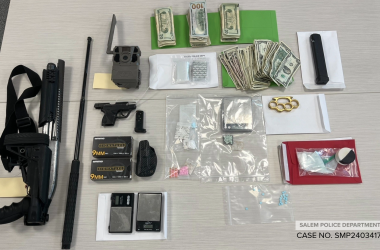 Current Mayor Chuck Bennett (left) is running against Brooke Jackson (right) in the upcoming election.
Current Mayor Chuck Bennett (left) is running against Brooke Jackson (right) in the upcoming election.
Salem Reporter wanted to know what issues were top of mind for this year’s crop of candidates for Salem City Council. We provided each candidate written questions intended to elicit their understanding of challenges the city faces and how they would overcome them. We have published past candidates’ responses in recent days.
For the position of mayor, a two-year term, Brooke Jackson is running against current Mayor Chuck Bennett. Jackson didn’t respond to Salem Reporter’s questionnaire.
The election is on May 19.
Name: Chuck Bennett
Age: 71
Home: Salem
Employer/position: Mayor of the City of Salem (volunteer)
Years in position: 3 years
List leadership positions you have held in any nonprofit or civic organizations in the past five years.
Board of Directors, SEDCOR (Strategic Economic Development Corporation)
List any government service in the past five years, including boards/commissions and any leadership roles.
Mayor, City of Salem; chair, Capitol Planning Commission; Advisory Board of Salem Keizer Career and Technical Education Center; member, Mid- Valley Economic Recovery Team; chair, Council Legislative Committee and Boards and Commissions Committee.
What are the two defining issues facing Salem City Council right now?
Reopening Salem business, education and civic life after the Covid-19 shutdown.
Homelessness
List the three steps you would take to address those issues.
I am on the Mid Valley Economic Recovery Team working on the detailed strategies required under federal and state guidelines to reopen our community after the current shutdown. After those steps are developed, determining a timeline that is both rapid and safe. Place the systems in place that protect the community until a vaccine is developed but also allows for active economic activity.
Continue the work started three years ago with the housing-first Housing Rental Assistance Program that has housed over 275 of Salem’s hardest to house, long-term homeless who have other issues like health issues, drug or alcohol dependence, are at least 10 years unsheltered and often have felony convictions on their record. Also, continue work to add additional housing including ones we are working on for those with immediate medical issues and mental health problems. Continue to actively support Salem’s long-term housing strategy that provides housing for about 8,000 low-income residents through our Housing Authority. And, continue our close working relationship and financial support for a variety of non-profit organizations that provide assistance, service and programs for homeless residents in crisis including ARCHES, Union Gospel Mission, Center for Hope and Safety, Salvation Army, various health and church projects and direct city funded services.
How would those steps lead to a better life for Salem’s residents?
We need to get back to the strong economy we had before the Covid outbreak that had us at some of the lowest local unemployment rates in history, a vibrant downtown and community business and manufacturing sector and a thriving development industry that meets both our commercial and housing needs.
The Salem City Council is often described as being made up of progressives and conservatives. What should voters know about your general posture towards issues that would place you in either one of those bloc?
The conservative or progressive labels don’t really reflect the work done by the city council, which is non partisan and aimed at meeting basic public health, safety and welfare needs. There is no debate on homelessness, the need for jobs, the protection and improvement of our water supply, an efficient and safe transportation system, the importance of public safety, parks, the library or the general livability of our neighborhoods. Clean air, well maintained and located parks, a well-run sewer system and a balanced city budget are just basic as well. I’ve been on the council for almost thirteen years and involved in the Planning Commission, Budget Committee, Library Board, Cultural and Tourism Advisory Board as well as a whole range of task forces and committees. None of these have really fit into an ideological slot. Rather, citizens in Salem expect good service, well run government that meets their needs and is well managed.
What key change or improvement would you like to see Salem make in the next 20 years?
The city must deal with its transportation system. We need another bridge, well maintained roads, bikeways and sidewalks and a robust public transit system. We are expected to grow by 60,000 new residents and housing and transportation will have to be central to keeping the city well-run, livable and successful.
In 300 words, please provide an example or examples of a project or issue you were directly addressed in a leadership role. We are looking for examples of how your involvement resulted in specific action to resolve or improve a local issue.
I began the city’s housing first program my first month in office (the Housing Rental Assistance Program, HRAP). It is the largest dispersed housing-first program in the state. It targets the long-term homeless who have been on the street for at least 10 years. I discovered this group was among the most vulnerable people in our community and there were no housing or service programs that directly targeted their needs. I found that unacceptable. HRAP provides homeless residents with housing in cooperation with local landlords and treatment or support programs that address the issues that either got them homeless or is keeping them homeless. I recently attended the graduation of many of our early participants in the program. I was moved by their stories of getting out of the situation they were in, improving their lives, stabilizing their health and having stable housing after years on the street. I’m very proud of this program and of the strong support it has received from the community and the city council.
In 300 words, please provide an example of a decision you made or action you took later proved to be unsuccessful or misguided. We are looking for an example of how you deal with failure or mistakes.
About 10 years ago I voted against a water rate increase. I thought we could skip one increase during the recession, and it would have little or no impact on water service. After a couple of years, it became clear that without the council policy of steady, fairly small increases every year or two, the water systems funding is seriously affected. The result was the need to increase the rates more than it would have been if we had just followed the small, steady increases. All of this really came home to me when our system faced the serious algae bloom problem a couple of years ago and the water fund was able to address it with available funds in less than two weeks. With that back up fund the city has been able to do the upgrades needed to meet both water quality and quantity issues we’ve been working on for the past couple of years.
In less than 100 words, describe why you want this office and how your candidacy would improve Salem.
I have been honored to serve this community for decades in a variety of capacities including three years as mayor. There is a great deal more to do on my agenda and I look forward to playing a key role as we move forward. Leadership requires both knowledge of issues and our community. After 54 years in Salem, I have both and am comfortable with my qualifications and personal commitment to meet the challenges of being mayor again in Salem. I’m proud of all we’ve achieved and know we can do more.
Related coverage:
CITY ELECTIONS: In downtown Salem ward, council candidates cite homelessness as defining issue
CITY ELECTIONS: In southeast Salem ward, council candidates want improved infrastructure
CITY ELECTIONS: In northeast Salem ward, candidates want stronger voice for constituents
CITY ELECTIONS: In south Salem ward, candidates list economic recovery from COVID as defining issue









